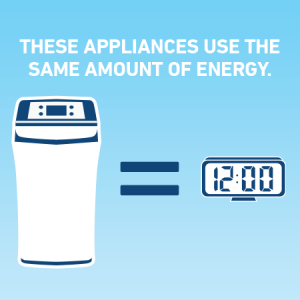A water softener must use a lot of energy
Just because you add another electricity-using appliance to the home doesn’t mean it’s going to be an energy drain. In fact, a water softener doesn’t use as much energy as you might expect. The energy required to run a water softener over the course of one year is the same as what an alarm clock uses in a year, which is about 70 kWh, or less than $10 per year based on US average energy rates (and without that annoying beep). Most new softeners regenerate only when you need them to, so water and energy use are optimized. For an average family of four, the water softener runs fewer than five times a month.
Saving energy through soft water
A water softener is well worth the initial investment because it instantly starts improving the quality of water, saving you money across multiple areas of the home. Because a water softener prevents scale buildup in your home’s pipes, in major appliances and on faucets, it increases their longevity and operational efficiency. In fact, appliances could last 30% to 50% longer when they use soft water. Since the presence of excess scale buildup results in heat loss, it’s twice as hard to get your water hot and plumbed to where it needs to be. With soft water, your water heater doesn’t have to work as hard, saving you up to 27% on energy costs in a single year.1
How you save more money (and your home)
Aside from energy savings, soft water helps protect the home’s plumbing. If you think about it, pipes are essentially the veins and arteries of the home, and appliances are the major organs. If the arteries are clogged and dirty, then the organs will fail. Over time, hard water minerals accumulate on the insides of pipes, eventually cutting off the water supply. If damaged badly enough, the only solution is to replace your home’s entire plumbing system, and that could cost thousands of dollars. Subsequently, hard water will also cause buildup inside your appliances and clog the valves, which can lead to leaks, costly repairs and premature replacement costs. The replacement costs of appliances due to hard water corrosion ranges from $400 to $1,500 for a washer and $300 to $800 for a water heater. The addition of a water softener to your home helps you avoid these costly problems.
If not now, when?
With only a minimal uptick in energy use and the ability to save thousands of dollars over the course of its lifespan, a water softener is an ideal solution to have in the home. After purchasing a softener, you’ll see savings across your entire home, and the system will pay for itself in about a year.
Unsure where to begin? Start by requesting a free hard water test strip to learn your water’s hardness number, and then use this easy step-by-step tool to receive a recommendation for the right water softener for you or visit our preferred retailer, EcoWater, for your water softening needs.
1 Based on research conducted by the Battelle Memorial Institute for the Water Quality Association (WQA).

